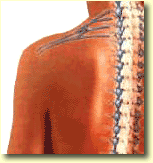 |
The brain "talks" with the rest of the body through a vast telecommunications system made up of nerves. Nerves come out of the brain in a large bundle called the spinal chord, travel down our backs inside the spinal column and exit at different levels. Some exit through our neck to go to our throat or heart, while others exit in our lower back to go to our legs, adrenals, bladder and other organs. Some nerves go straight to the destination but some first mix with others to form complicated nerve networks called a plexus. We have a number of these nerve plexuses in our body: the cervical plexus on each side of our neck, the brachial plexus near our shoulders, the solar plexus near our stomach, and many, many others, both large and small. |
The brachial plexus is made up of nerves which come out of the middle and lower neck and lower back. After they interconnect to form the brachial plexus, they branch off to supply different areas, especially the shoulders, arms, elbows, wrists, hands, and fingers.
The most common form of brachial plexus damage is really damage to the nerves which make up the brachial plexus as they exit the spinal column through openings between the bones (foramina). If the openings become smaller, the nerves become compressed or impinged (commonly called "pinched").
What causes the nerves to get pinched? Many things: long standing spinal stress, old injuries from childhood, new injuries from sports mishaps (especially racket sports), car accidents (especially whiplash), arthritis, sleeping in an awkward position, and even chronic emotional stress.
Depending on which brachial plexus
nerves are damaged, different symptoms and problems may be experienced.
There may be neck stiffness or pain that may radiate to the shoulder, elbow, and
down the arm, wrist, hand or finger(s). Sometimes there's clicking or extremity
pain but not neck pain. Sometimes there's no pain but numbness or feelings of
heat or cold or swelling; or pain in one area and numbness in another; or
"pins and needles" or muscle weakness or spasm. Because of the
complicated way nerves interrelate, conditions such as headache; migraine;
facial pain; dizziness; limited, painful or stiff motion of the head and neck;
throat conditions; thyroid, nasal problems; low back pain and even epilepsy have
been reported as being caused by brachial plexus damage.
Chiropractic care is essential for anyone with shoulder, arm, elbow, and hand problems to relieve nerve stress and permit the spine, as well as the rest of the body, to function more normally.
Conditions
Treated | Subluxation Complex | Subluxation
Degeneration
Neck | Headache | Shoulder | Back
| Disc | Sciatica
Pregnancy | Kids
| Sports



